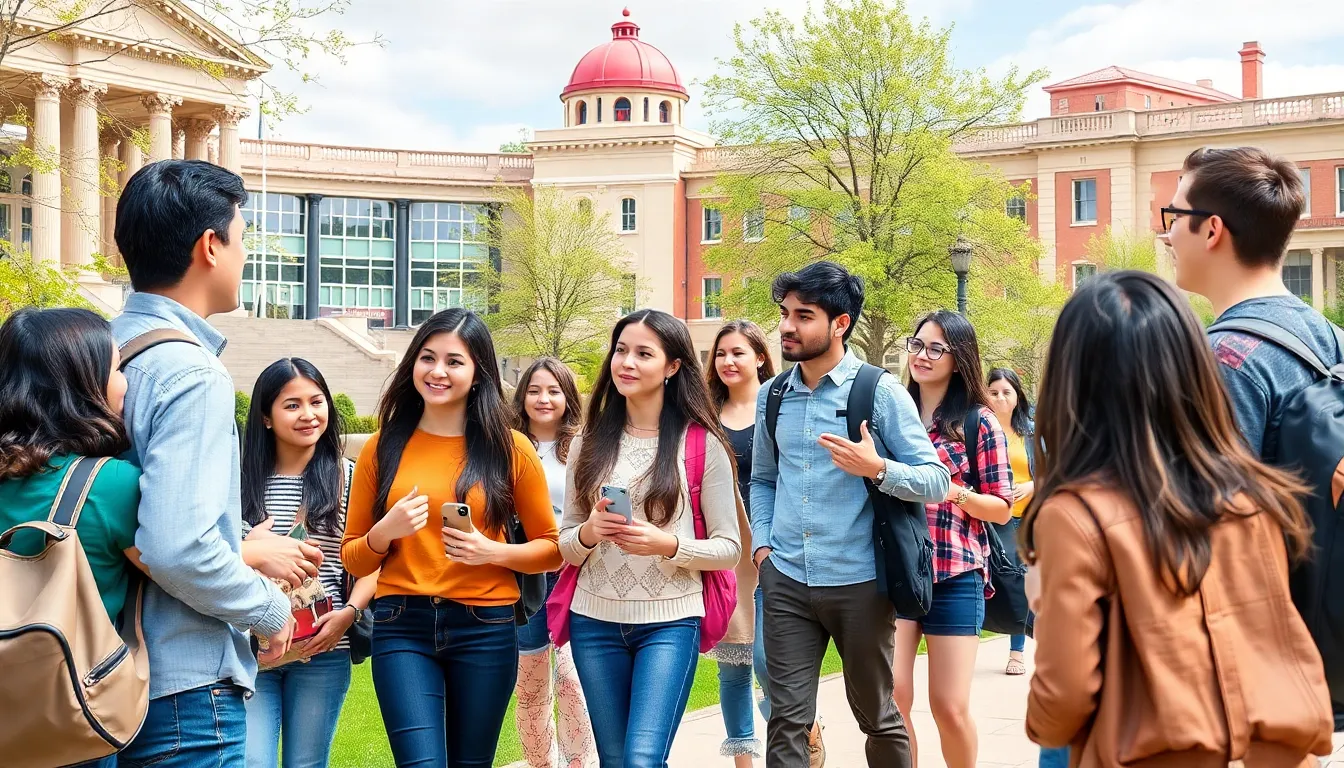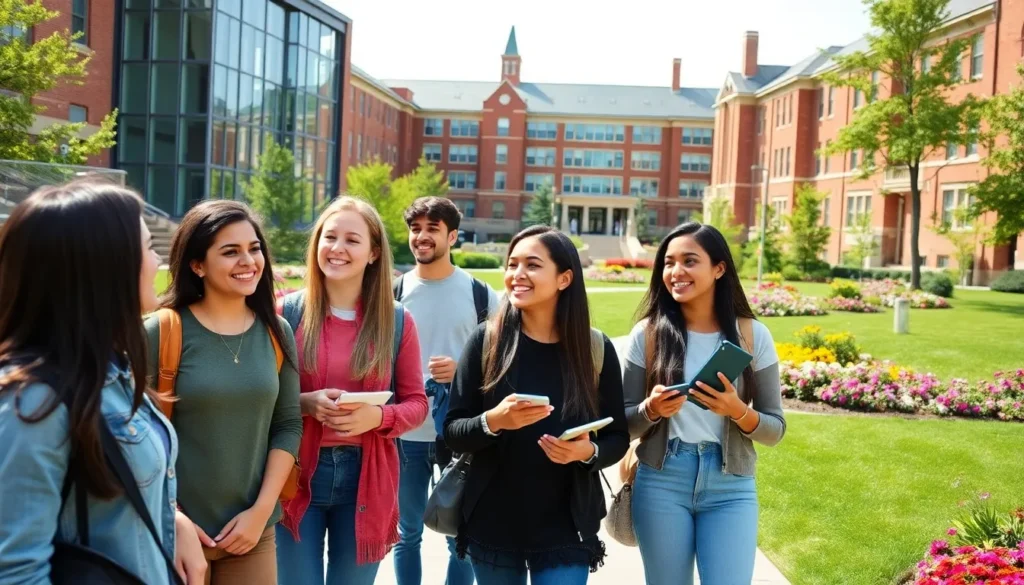Planning a college tour? Get ready for a whirlwind adventure that’s part academic exploration and part scavenger hunt for the best campus coffee! As students step onto sprawling campuses, they’re not just checking out buildings; they’re hunting for their future. College tours are the ultimate sneak peek into the lives they might lead, complete with quirky traditions and the chance to pretend they’re already part of the campus community.
But let’s be honest: not all college tours are created equal. Some are filled with enthusiastic guides who can recite the history of the library’s brickwork, while others feel more like a forced march through a maze of dorms. With a bit of preparation and a sense of humor, students can turn this rite of passage into an unforgettable experience. After all, who wouldn’t want to find their dream school while sipping questionable cafeteria coffee?
Table of Contents
ToggleWhat Are College Tours?
College tours serve as an essential component of the college selection process. These visits provide students with the opportunity to explore campuses firsthand. Various aspects, such as academic programs, campus facilities, and social environments, contribute to the overall experience.
Typically, tours include guided walks led by current students or admissions staff. These guides share valuable insights about university life, academic offerings, and student organizations. Interactive components, like Q&A sessions, allow prospective students to engage and clarify doubts about their potential schools.
Important elements of college tours often include visits to classrooms, libraries, and dormitories. Sightseeing these spaces helps students envision their future lives on campus. Additionally, exposure to unique traditions and community events can shape a student’s perception of a school’s culture.
Some tours offer thematic focus areas, such as engineering or arts programs. Specialized tours cater to specific interests, allowing students to dive deeper into their chosen fields. Technology-driven presentations may enhance the experience further, providing students with innovative ways to gather information.
Timing also plays a crucial role in maximizing the college tour experience. Visiting during open house events or prospective student days offers a chance to interact with faculty and additional resources. These events often facilitate a more immersive experience, enabling students to feel connected to the community.
College tours encompass more than mere sightseeing. They play a vital role in helping students assess potential institutions, identify features they value, and ultimately shape their academic journeys. Taking the time to explore different campuses positively impacts the decision-making process.
Importance of College Tours

College tours play a vital role in the college selection process. These visits help students visualize their future on campus while providing insights into academic and social dynamics.
Benefits for Students
Experiencing college tours allows students to explore diverse campuses. They can assess academic programs tailored to their interests. Engaging with current students during tours offers authentic perspectives on university life. Observing facilities such as libraries, dining halls, and dorms helps them envision living on campus. Asking questions during interactive sessions clarifies doubts and provides vital information. Attending theme-specific tours, like those focusing on engineering or arts, enables students to discover niche opportunities. Enjoying the campus atmosphere, including students’ interactions and traditions, creates connections that influence their decision-making.
Benefits for Parents
Parents gain valuable insights into campus environments during college tours. Observing the facilities enhances their understanding of the school’s offerings. Meeting admissions staff and tour guides provides clarity on academic programs and support services. Parents can evaluate the campus culture, which helps them gauge how well their child might fit in. Engaging with other families during tours fosters a sense of community and provides networking opportunities. These visits help parents gauge tuition and financial aid processes, ensuring informed discussions about college funding. Ultimately, being involved in the process alongside their child strengthens family support in the college decision-making journey.
Types of College Tours
Understanding the types of college tours helps students navigate their options effectively. Each tour type offers unique benefits that can aid in the decision-making process.
Guided Tours
Guided tours provide a structured experience led by current students or admissions staff. These leaders share insights about academics and campus life. Attendees can explore essential areas like classrooms, libraries, and dormitories. Interaction during these tours fosters engagement through Q&A sessions, allowing prospective students to ask direct questions. Tour leaders often highlight university traditions, enhancing the understanding of campus culture. Students and families benefit from firsthand perspectives, making guided tours a popular choice for many.
Self-Guided Tours
Self-guided tours grant students the freedom to explore at their own pace. Individuals can choose which areas to visit based on personal interests, such as residence halls or specific departments. Many colleges provide materials like maps and brochures to enhance the experience. Elements such as themed tours focusing on major subjects can cater to specific academic interests. Flexibility in scheduling makes self-guided tours appealing, accommodating various timelines. This independence encourages thorough exploration, allowing for personalized evaluation of the campus.
Virtual Tours
Virtual tours offer a convenient alternative for those unable to visit campuses in person. With interactive features, these online experiences provide a comprehensive view of facilities. Students can engage with multimedia content, including videos and virtual reality options. Accessibility plays a crucial role, allowing individuals to connect with colleges worldwide. Virtual tours often include detailed information about programs and campus activities. This format helps students visualize their future without the constraints of travel, making it a valuable resource in the college selection process.
Tips for Making the Most of College Tours
Maximizing the college tour experience involves thoughtful preparation and engagement. Students should consider various strategies to ensure their visits are informative and enjoyable.
Planning Your Visits
Choosing the right time for campus visits can significantly enhance the experience. Scheduling visits during open house events allows students to engage with multiple departments and attend presentations. Setting a realistic itinerary helps manage time better; visiting three to four campuses in a week offers balance without rushing. Noting personal interests also aids in prioritizing visits, so students can focus on schools with strong programs in their desired fields. Additionally, checking campus calendars for events, activities or special tours provides insight into student life, making it easier to evaluate fit.
Questions to Ask During the Tour
Crafting a list of pertinent questions enhances understanding during tours. Inquiring about opportunities for undergraduate research provides insights into academic engagement. Students should ask about academic resources like tutoring centers, libraries and study spaces. Exploring details about campus culture is essential; asking current students about their experiences can offer unique perspectives. It’s also helpful to pose questions regarding housing options, dining plans and club activities, ensuring a well-rounded view of campus life. Engaging with tour guides during Q&A sessions fosters a deeper connection to the campus environment.
Smartphone Apps for College Tours
Using smartphone apps can simplify the college tour experience. Some apps offer interactive maps, guiding users through important campus landmarks. Other apps feature customizable itineraries that help students track their visits efficiently. Students can also find platforms that include reviews and tips from fellow prospective students, providing valuable insights. Incorporating apps with virtual tour options can enhance the experience for those unable to visit in person. Utilizing technology in this manner amplifies the ability to gather information from multiple sources, boosting decision-making confidence.
College tours play a crucial role in the college selection process. They provide students with the opportunity to explore campuses and envision their future lives in an academic setting. By engaging with current students and experiencing the campus environment firsthand, students can gather valuable insights that go beyond brochures and websites.
Whether opting for guided tours, self-guided explorations, or virtual experiences, each option offers distinct advantages. With thoughtful preparation and an open mind, students can maximize their visits and make informed decisions about their educational futures. Ultimately, these tours not only help students find the right fit but also foster a sense of community among families navigating this significant transition together.





